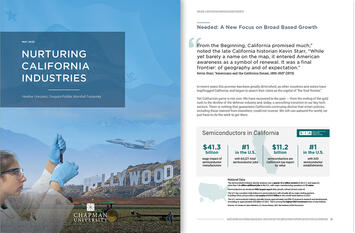
California has the opportunity to maintain and grow industries that can provide future jobs to middle class citizens and make the state more competitive. Below is an excerpt from this newly released report.
The focus of this joint project between The Chapman Center for Demographics and Policy and the New California Coalition lies in trying to create better employment opportunities for Californians. We look at which industries our states still maintain strategic advantages that we can build on. This will require some major changes in how the state operates, particularly on the regulatory side. It will also require a ratcheting up of state economic development and skills training programs.
Our focus is not primarily a typical “pro-business” agenda in that our primary interest lies in creating conditions that benefit the bulk of Californians. If the majority thrives, so too will most business. An economy that enriches only a few and offers little to others is, in the most fundamental way, unsustainable for the long-term future.
Read/download the full report here
About the authors:
Heather Gonzalez is an independent policy analyst with over two decades of experience in federal and state government. She served as a specialist with the non-partisan Congressional Research Service (CRS), where she advised Members of Congress and their staff on the America COMPETES Act(s) and U.S. competitiveness and innovation-related programs, funding, and policies. At the state level, she worked on issues related to technology and education as senior staff to two Silicon Valley state senators (Vasconcellos and Simitian). Gonzalez graduated Phi Beta Kappa with a B.A. in Anthropology from the University of California, Santa Cruz and has a master’s in public policy from Pepperdine. She lives in San Francisco.
Sougata Poddar has taught Economics, Statistics and Business in various leading universities worldwide for several years. His areas of research interest are Applied Economic Theory, Industrial Organization and Competition Policy. He has published widely in the field of Technology Transfer and Licensing, Economics of Digital Piracy and Copyright Issues. His publications appeared in Economic Theory, Economics Letters, International Journal of Industrial Organization, Oxford Economic Papers, Review of Industrial Organization among other leading journals of economics and generated significant research impact and citations. His main research focus is to understand and analyze the impact of consumer behavior, firm strategies, emerging technologies and technology trends in the decision-making process of firms and competition policies from government agencies. Sougata is an economics faculty at the Argyros School of Business and Economics in Chapman University. He lives in Irvine, California.
Marshall Toplansky is an award-winning Innovation Professor of Management Science at the Argyros School of Business and Economics at Chapman University. He is a research fellow at the Center for Demographics and Policy and is director of the school’s Analytics Accelerator program. He and co-author Joel Kotkin recently published an economic and social policy brief entitled, “Restoring the California Dream”, which discusses the issues the state faces in maintaining home ownership for the middle class and rebuilding a positive business climate. Marshall is also co-host of “The Feudal Future Podcast”, which is seen twice monthly by viewers around the world.
Editor:
Joel Kotkin is the RC Hobbs Presidential Fellow in Urban Futures and author of eleven books, including The City: A Global History, The Human City: Urbanism for the Rest of Us and, most recently, The Rise of Neo-Feudalism: A Warning to the Global Middle Class. He writes a regular column for Quillette, the American Mind, the National Post (Canada) and Spiked. He also writes for Unherd, National Review, the Los Angeles Times, and the Spectator. He has written extensively on issues on class and housing in Europe, North America and East Asia.












